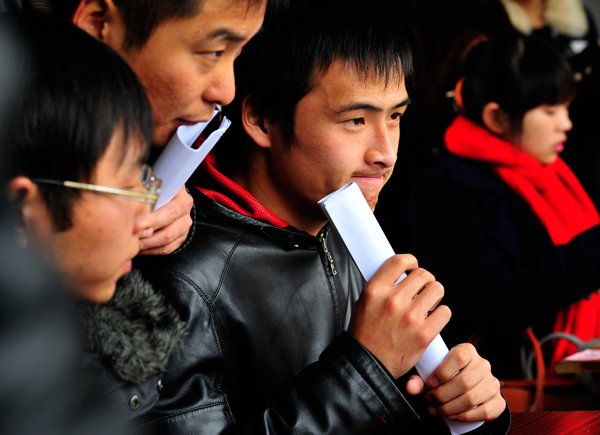

 |
|
Students attend a job fair targeting next year's college graduates in Huai'an, Jiangsu province, on Saturday. A record 7.27 million college graduates are expected to enter the workforce next year.[He Jinghua / for China Daily] |
Experts urged the introduction of independent reports from a third party and continuous tracking to better reflect the nature of graduate employment.
The ministry said a new record of about 7.27 million college graduates on the Chinese mainland will enter the labor market in 2014.
That number is near the total population of Switzerland, which was 8 million in 2013.
Universities and higher vocational institutes should draft and make public annual reports on graduate employment, including trends and feedback for teaching and enrollment plans, the ministry said on Friday. The plan was announced at a video conference with about 8,000 attendants from local educational authorities, higher educational institutions and human resource departments.
The annual employment quality report should be a significant reference for universities in setting enrollment plans in the future to better reflect the market demand for skills, the ministry said on its website.
Xiong Bingqi, deputy director at the 21st Century Education Research Institute in Shanghai, welcomed the change, saying the move from releasing the employment rate of graduates to detailed reports of employment type represents progress.
"Incomplete information disclosure sometimes misleads the media into concluding that graduates from higher vocational schools enjoy better employment prospects than those with master's degrees simply based on their employment rates, without considering the difference in positions, starting salary and career prospects," he said.
However, requiring universities to make such reports will create opportunities for information fraud, he said.
"It will be hard to guarantee the credibility of such reports and you cannot expect such false information to provide guidance for teaching and management," he said.
Chen Yu, director of the China Institute for Occupation Research at Peking University, suggested higher educational institutes should include follow-up surveys in their graduate employment reports.
Currently, universities only record the employment rate for graduates at the end of June, when the school year ends.
Such statistics also fail to reflect the changes college graduates will make after they enter the labor market, Chen said, adding that it would be more scientific and reasonable to do tracking studies at least six months after the annual graduation.
He predicted tougher employment prospects for college graduates because of the increased number of graduates in 2014 and the economic downturn.
Huang Yuanfu, a senior taking journalism studies at Renmin University of China started hunting for sales positions in private companies in September.
"It did not go as smoothly as I imagined. Most of my applications went unanswered or I was not shortlisted because I lacked a background in business studies," he said.
The 21-year-old said he has never worried about finding a job after graduation, but he is not sure if he will find a job he likes.
Wang Yujun, an official from the Ministry of Human Resources and Social Security, was reported in Chinese media in August as saying about 3 million college graduates failed to find jobs in 2013. That figure included those who graduated the previous year but are still jobless.
 Model with modified Audi A5
Model with modified Audi A5
 Model with German luxury cars
Model with German luxury cars
 Getting in the mood
Getting in the mood
 Models at Mercedes pavilion at 2013 Auto Guangzhou
Models at Mercedes pavilion at 2013 Auto Guangzhou
 Buick Riviera concept car at 2013 Auto Guangzhou
Buick Riviera concept car at 2013 Auto Guangzhou
 FAW-VW all-new Golf at Guangzhou auto show
FAW-VW all-new Golf at Guangzhou auto show
 VW donates more than 5k child safety seats
VW donates more than 5k child safety seats
 Honda models at 2013 Guangzhou auto show
Honda models at 2013 Guangzhou auto show